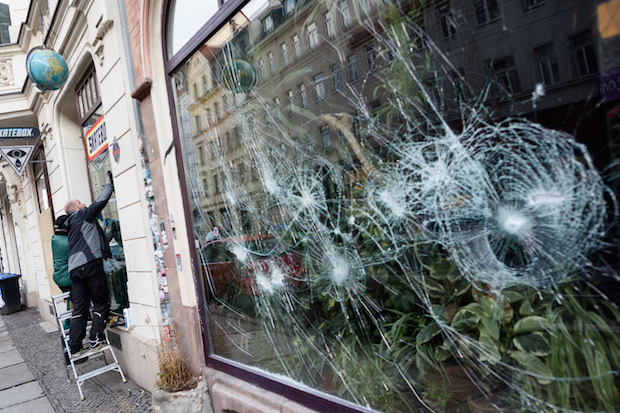Ross Douthat’s 10 points about immigration is recommended reading for anyone sitting on the fence or who tends towards the open border position; even if you disagree, you’ll at least have an idea of what the opposition believe. Personally I agree with it all anyway and my opinions on the subject are as frozen in aspic as my musical tastes and haircut.
Not that many people are likely to change their minds, of course, this being a subject more of the heart than the head, on both sides of the debate. I’d go as far as to say it that immigration has become a sacred idea, and that many believe multiculturalism to be a moral good in itself, whatever the end result. This is why, uniquely among any subject discussed in the news, its downsides come with a caveat that ‘this subject will be used by right-wing extremists’. The outrageous behaviour of bankers, for example, is never reported alongside fears that the news will be ‘exploited by left-wing extremists’.
The media and government fear a repeat of the horrors of 1914-45, so shy away from mentioning negative aspects of multiculturalism, as highlighted by the cover-up in Cologne. (As with many events, the cover-up has caused more upset than the crime.) This is hardly surprising. ‘Follow the sacred,’ as Righteous Mind author Jonathan Haidt said, ‘and there you will find a circle of motivated ignorance.’
In Haidtian terms, proponents of the multicultural society also feel a strong urge to protect perceived victims, in this case migrants, which is why there is often a blind spot about commenting on violence and victimisation by minorities. In my experience, few feminists would be prepared to sacrifice their beliefs in the name of multiculturalism. It’s true, though, that diversity is a sacred idea, which leads to sensitivity about some of the ‘challenges’ of mass migration, as the Economist euphemistically calls them.
Perhaps the most telling comments came from Ralf Jaeger, interior minister for North Rhine-Westphalia, who said: ‘What happens on right-wing platforms & chat rooms is at least as awful as the acts of those assaulting the women. This is poisoning the climate of our society.’ One might suggest that importing 1.2m or so people from vastly different cultures – rather than the reaction – was more likely to affect the climate of the society. One might add that internet chatter, however extreme or poisonous, was not comparable to actual sexual assault, and that such a comparison was morally bankrupt.
But the point of sacred ideas is that they drive us towards irrational positions that we might otherwise find absurd. They also push people into making poor choices: if your obsession with the right-wing causes you to downplay or ignore major social problems that result from multiculturalism, then surely you are more likely to cause nationalist extremism to flourish? As I have said before, Europe is like Oedipus – by trying to avoid a disastrous future, it is doing everything to make it happen.
The problem with taboos is that they can be broken by big events. Islamic terrorism gets far more attention than other problems borne of diversity. While it affects very few people in western Europe, when it does, it has a huge impact and therefore can’t be ignored; contrast the huge amount of negative press Islamism gets with, say, street robbery or (until recently) sexual abuse. These can be diversity-related problems, but are almost never discussed and yet have more of an impact on many people’s lives. (And this is just for western Europeans – an American’s chances of being harmed by Islamic terrorism are infinitely small.) To make a comparison, imagine that there was only one car crash a year in Britain, but 100 people were killed in it; cars would be hugely controversial, politicians would be calling for them to be banned and car-drivers would be spat at. Instead five people lose their lives every day in cars – 1,700 a year – and no one bats an eyelid.
The mass sexual assaults of New Year’s Eve are an example of a big taboo-breaker, and once the taboo about mentioning them is out, they tend to become enormous, and dangerous, subjects. It has almost not been noticed this week, because 69-year-olds keep dying, but in both Germany and the Netherlands, the radical right-wing parties have unprecedented levels of support. Meanwhile foreign-owned shops in Leipzig have been smashed up and Jews have been attacked both by asylum seekers and by right-wing extremists – who mistook them for Arabs. History doesn’t repeat itself, but it does rhyme, as Mark Twain probably didn’t say. It’s just not a very good rhyme in this case.







Comments